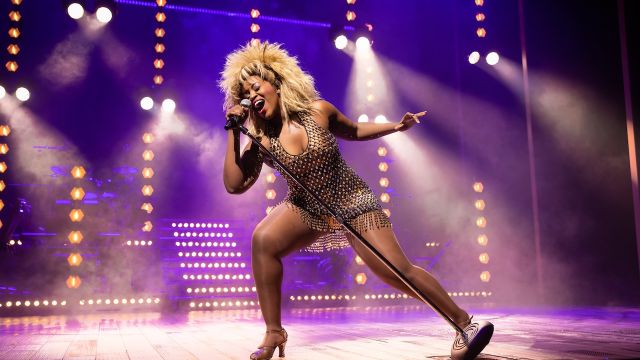The Truth of the Legend
Coral Drouyn reminisces on 50 years of Tina Turner, who died in May at the age of 83, while she and David Spicer talk to the stars of TINA – The Tina Turner Musical, which is now open in Sydney.
She burst onto the stage, all legs and flailing hair, in a gold shimmy dress that screamed attitude, and impossibly high heels. The horn section vamped while she eyed the audience like an Amazon warrior ready to attack, as the drummer played a cross stick rock rimshot, and the tall, mean-looking guy in the too large zoot suit (or maybe he’d just lost weight from all the drugs) eyed her with a sense of ownership and perhaps anger that the follow spot was on her, his creation, and not on him.
Then she sang, with a voice like gravel dipped in chocolate (from memory the song was ‘Shake a Tail Feather’) and no-one in that audience would ever be quite the same again. And I was there, in 1975, when the act did a two-concert stopover in Sydney, waiting for Tina’s signature song ‘Nutbush City Limits’. Australia was the only country in the world where the single reached number one on the charts.
That’s one of the better things about growing old, you got to see the legends before they became mythical characters or simply part of history. Tina Turner is one such legend, so it’s hard for me to rationalise that it’s nearly fifty years ago, yet more people know her name now than at any time in her long life as a performer and a woman.
But it didn’t start with ‘Nutbush’. I was a fan of Phil Spector’s Wall of Sound, as were most of us back in the ‘60s. It was extravagant, over the top, lush - the antithesis of all the “new” groups of the time that relied on guitars and a pared back sound. ‘River Deep, Mountain High’ was an assault on the senses and was played round the clock on radios and jukeboxes. Spector’s time came and went - along with his music, and most of the credit went to Phil and not to Ike or Tina. But Tina was a survivor, right from the time she was Anna Mae Bullock, living out in those City Limits, or when Ike Turner picked her up and put her on stage at age 18, billed as Little Ann.
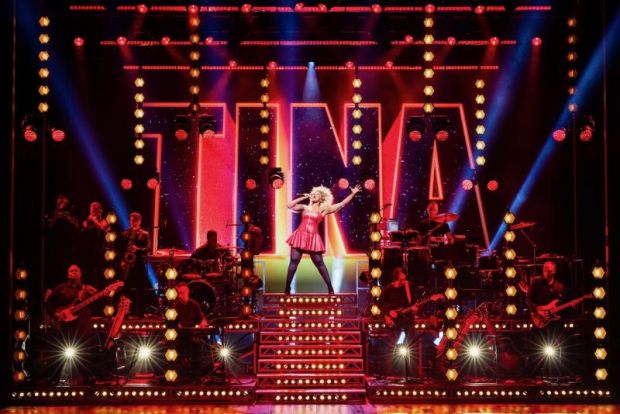
We now know all about the domestic violence, the drugs, the toxic co-dependent relationship, the horrors Tina Turner endured on the road to legendary status. We’ve read the books and the newspapers, seen the docos and the telemovies, watched her star fade only to burst into a supernova and be reborn. We understand, even though we can’t ever really know what it cost a simple southern girl who was working as a domestic servant for a white family, to ask a celebrated musician like Ike Turner (already a star in his community) to let her sing with him. It was her way out, but what a price she had to pay.
It seems that the only medium left in which to explore the story was a musical. Tina - The Tina Turner Musical is now far enough removed from the events of the past, that we can look at the story that underpins the great music, and ask ourselves, without Ike (despite the abuse), would there ever have been a Tina – Queen of Rock and Roll?
Add that story to nearly 30 all-time great musical numbers and it’s not hard to see why it’s a must-see show. And there’s a strong Australian connection. Roger Davies was Tina’s manager for the last 30 years of her career and is widely credited with giving her the break that launched her solo career.
The Broadway run of the show was cut short because of Covid-19, but still managed to log nearly 500 performances and garner 12 Tony nominations. To date, the show has received over 37 award nominations worldwide and been seen by hundreds of thousands of people who weren’t even alive when Tina won her first Grammy. That includes the two stars of the Australian production which opened on May 4 at Sydney’s Theatre Royal.
Ruva Ngwenya and Tim Omaji are both exceptional African / Australian talents, for whom music is part of their life blood, as natural to them as breathing. It’s exciting to finally see real diversity on our stages and we couldn’t let the chance to talk to these two amazing performers pass us by.
David Spicer had a chance to talk to Ruva, while Coral tried not to appear like the senior member of the Timomatic fan club when she talked to Tim.
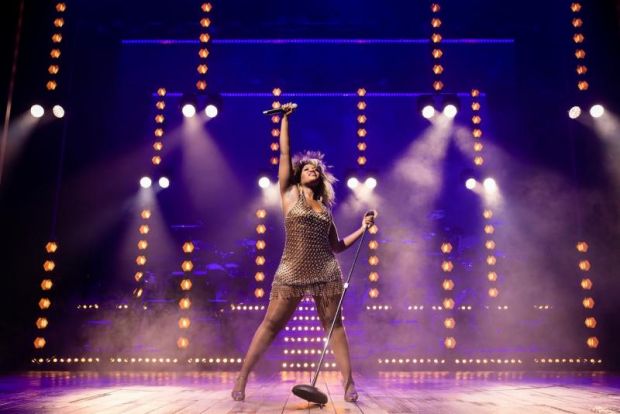
Zimbabwean Australian actress Ruva Ngwenya attracts talent scouts like a bee to honey. At school she was tapped by a teacher to sing a song Tina Turner style. Her first pro gig was as a 16 year in a jazz bar, and since scoring the role of Shenzi in The Lion King, she has skipped from one musical to the next.
David Spicer: What was your first big break in show business?
Ruva Ngwenya: I was studying Jazz at the VCA when I was scouted on Facebook by a casting director from The Lion King. I said to my friends I was invited to sing for this ‘Disney thing’. Then I got cast in the biggest show at the time, toured for three years and realised I found my home.
David: So did you finish University?
Ruva: I am a college drop out. I left uni because I got a gig and never looked back.
David: Doesn’t getting the lead in Tina count for a few units?
Ruva: I was in third year.
David: Maybe we should start a campaign to lobby Melbourne University to give you an honorary degree. And haven’t you been singing a long time?
Ruva: My nickname growing up was songbird. I would walk to school and the bus stop singing. Even today some people think I am crazy on the street as I am always singing. It is part of my DNA.
David: What made you take singing seriously?
Ruva: I was in Kew High (public school in Melbourne). I was a big sports girl, in the netball state team and was representing Australia in volleyball. Then the drama teacher told me I had to do the school musical in Year 10. I said OK. It was Leader of the Pack and there is a scene where my character had to sing a Tina Turner song – ‘River Deep, Mountain High’.
David: Did it go well?
Ruva: It was transformative. I blitzed it. I did commit to the costume (fishnet stockings and a cheap wig) and it was a really cool moment. Even to this day, people stop me and say I remember when you were in high school playing Tina Turner and everyone couldn’t stop talking about it, now you are doing it for real.
David: Did you tell this story about your high school performance at the audition for Tina?
Ruva: I didn’t. I was just trying not to vomit.
David: Did you succeed in not vomiting?
Ruva: Yes, I nailed it. It was one of the hardest audition processes. The dancing was gruelling. Everyone was on bended knee gasping for air, doing ‘Proud Mary’ for the tenth time. But also the acting, because the story of her life requires everything of you to be authentic and raw. You can’t go in there and be a showgirl. There was no time to be nervous. You had to really dig deep.
David: How big a break for you is this role?
Ruva: I am so grateful to jump from Moulin Rouge (in the role of Le Chocolat) to my first lead role in another massive spectacular show. I am very privileged.
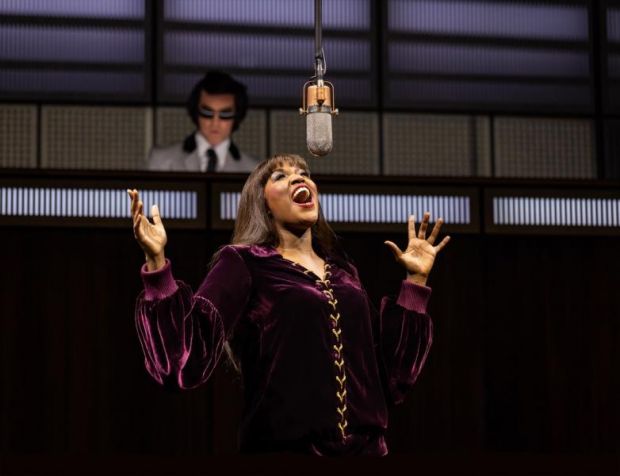
David: When you were researched the story of Tina Turner, were you surprised about anything in her background?
Ruva: I didn’t know about her humble beginnings. Also, I was surprised just how much grit she had, and how hard she had to work, supporting her kids by doing domestic work. Before her massive hit ‘What’s love got to do with it’ she was hustling.
David: What sort of stamina do you need for this role?
Ruva: I am in the gym every day, staying on top of my mental health and trying to eat as healthy as I can. When you are out there singing ‘Proud Mary’ and sweat is pouring down, you have got to be strong.
David: It is a heavy dance show?
Ruva: It is a massive dance show. But it is so much fun. When I saw it, I wanted to get up and dance.
David: How do you boil it down in a nutshell or should I say nut bush?
Ruva: Tina was an icon who broke down every barrier. More than the music also fashion and race. She remains an inspiration.
Nigerian born Tim Omaji might have been born into an academic African family, but his stage persona – Timomatic – is an all-Australian Superstar - singer, dancer, writer, choreographer and multi-platinum recording artist. A brilliant hip-hop stylist with the grace and flair of Fred Astaire, Tim decided conquering the dance world wasn’t enough to quench his thirst as an entertainer, so he started writing and recording songs. But that doesn’t explain the sideways move into musical theatre. Tim sums it up in two words:
Tim: “Accident” and “opportunity.” I’ve always been about exploring how far I could go with whatever talent I have. Let’s face it, I’m making it up as I go along. I never had the formal training that most of my peers in theatre had. But I made up for it with unshakeable faith that this was what I was meant to do (entertain). So Fame (the musical) came up by accident because of my appearances in So You Think You Can Dance, and then In The Heights was offered because of that and my rapping/ singing, and I seized the opportunity because it is such a great show, but I had no plans for musical theatre when I started.
Coral: And the acting?
Tim: Again, accidental! But I became fascinated by the power of it. You’re connecting with an audience at a much deeper level, even though you are being someone else - it isn’t real, and yet it has an even deeper truth than performing as yourself. The more I do, the hungrier I become to do more.
Coral: That makes this show and the role of Ike an absolute gift. How much did you know about Ike Turner before this?
Tim: Very little. Hey, I never knew them as an act; they split before I was born. I first heard Tina Turner when I was about six. She was at the NRL Grand Final in 1993 singing ‘Simply The Best’. I hadn’t heard ‘Nutbush’ or any of the earlier songs. Back then it wasn’t the kind of music we played in our straight Christian household. But the song stayed with me because I knew even then that I wanted to be the best I could possibly be at whatever I did.
Coral: So how do you approach playing a man who is basically considered a villain, a very flawed human being?
Tim: We are all flawed human beings so hopefully I’m approaching it with compassion and some degree of humility. I need to explore the human reasoning behind the man. We need to be aware of what shapes another person’s perspective. People who are hurt go on to hurt other people – and Ike was certainly hurt throughout the years that shaped him.
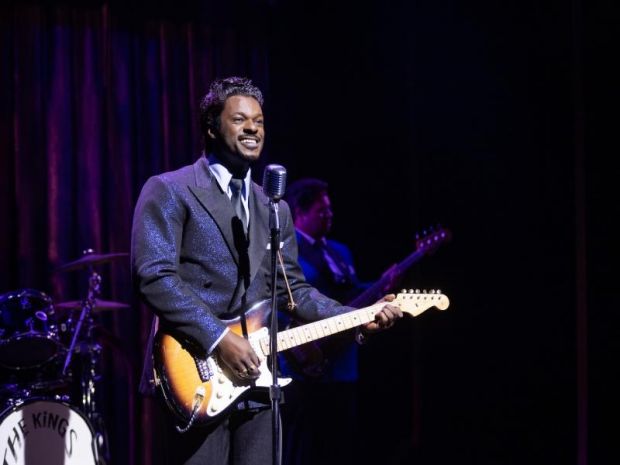
Coral: That’s a very mature P.O.V - obviously this is the right time for you to take on such a role.
Tim: Well, I’m at a point where I need my life to be authentic and mature, and Ike deserves to be played with authenticity and maturity. Was he a villain? Or someone who was very damaged and couldn’t find a way to his inner self? I’m not making a judgemental statement -just trying to give him HIS truth, not mine. Some people will be shocked by the domestic violence and toxicity, especially the fans of my music,
Coral: Does that worry you, especially in an era where role models are so scarce?
Tim: I don’t really feel a sense of responsibility. If I am ever a role model, then someone else has made me one. I do believe in my responsibility to be true to myself, and if I achieve all I can, then hopefully young people, whatever their colour, will take heart and know that it’s okay to aim high. That’s all I can do.
Coral: Yes, I call that “honour the gift”.
Tim: I like that, and “cherish the moment”. Sometimes you only need a three word mantra to keep you moving in the right direction.
Coral: And do you feel like you’re moving in that direction?
Tim: Step by Step. Right now, the most important thing is for me to make Ike a character the audience can connect with compassionately. I just hope I can make that happen.
Australian production images by Daniel Boud.
Subscribe to our E-Newsletter, buy our latest print edition or find a Performing Arts book at Book Nook.

